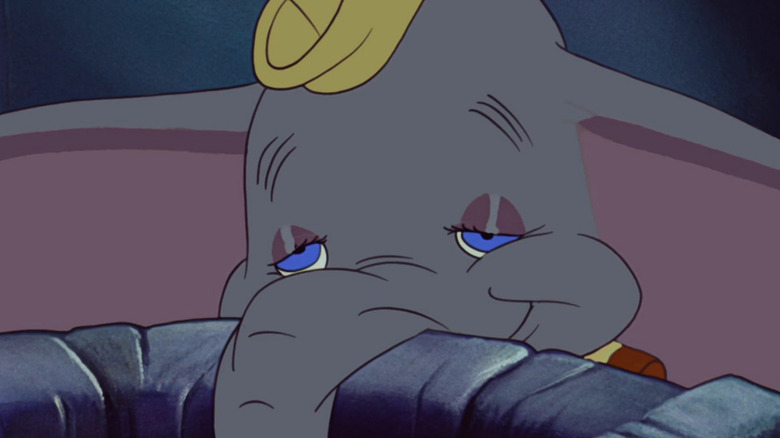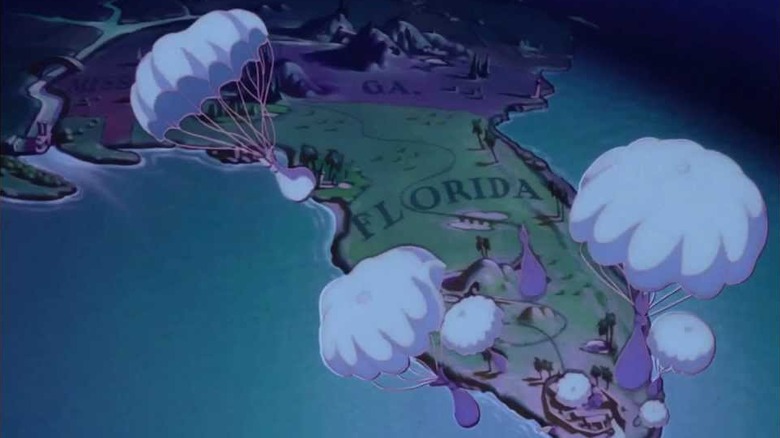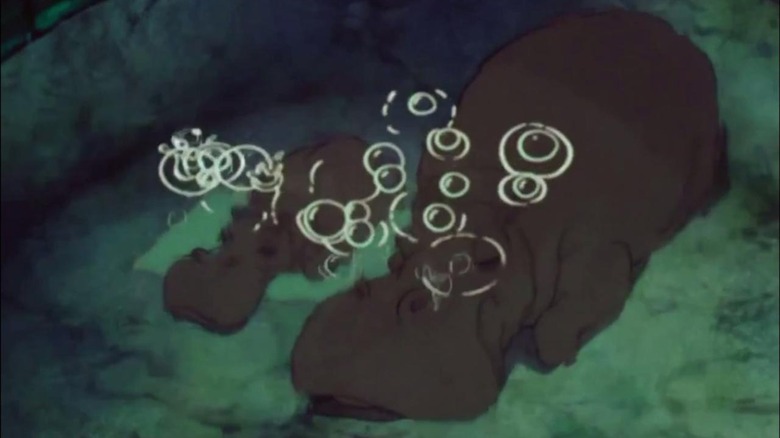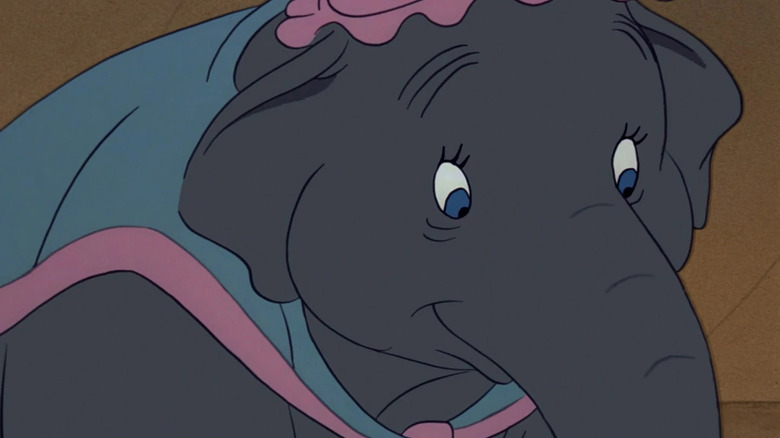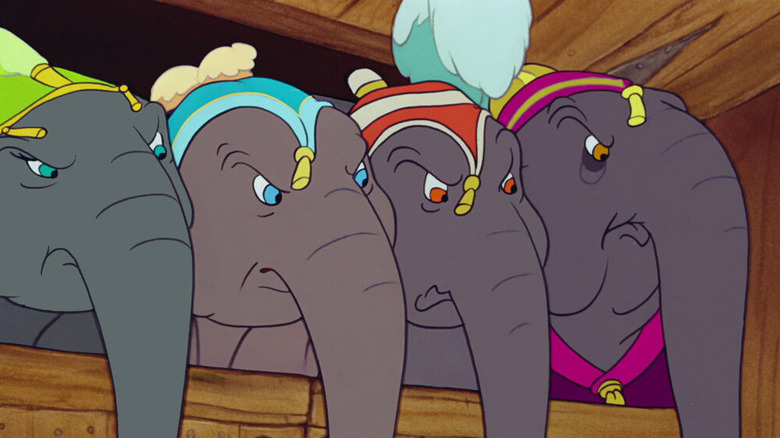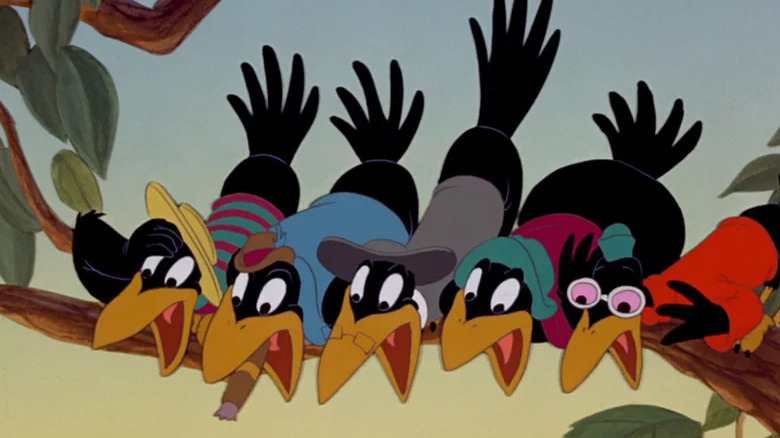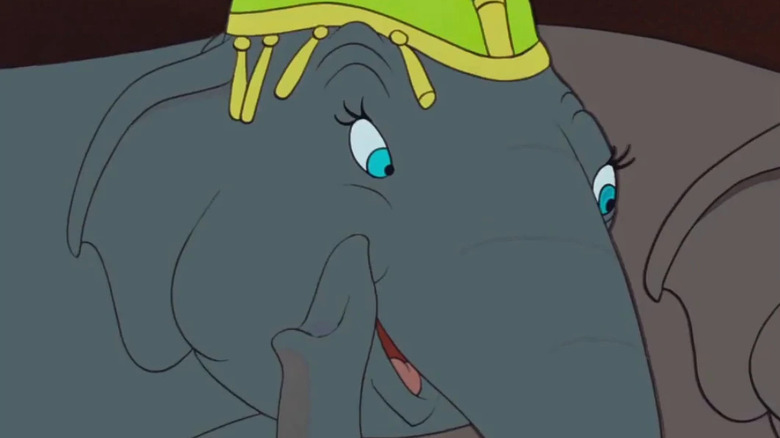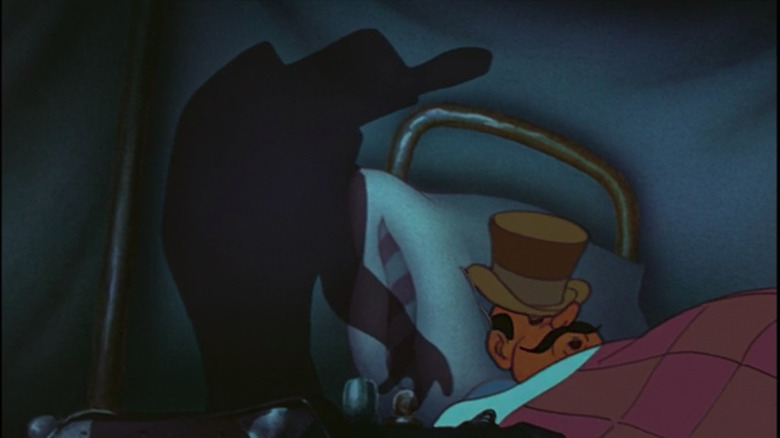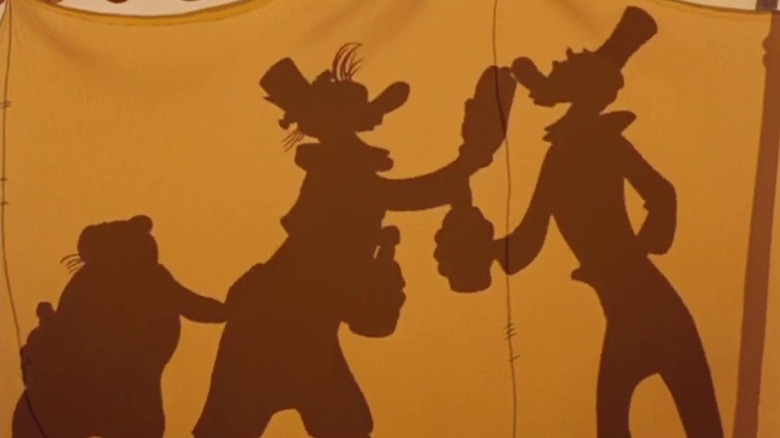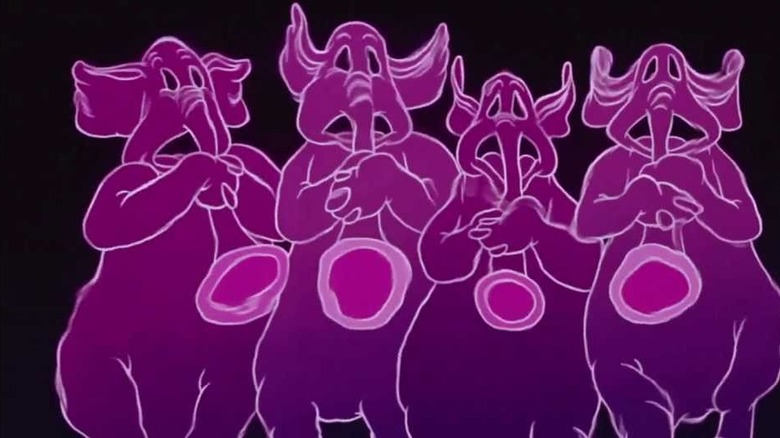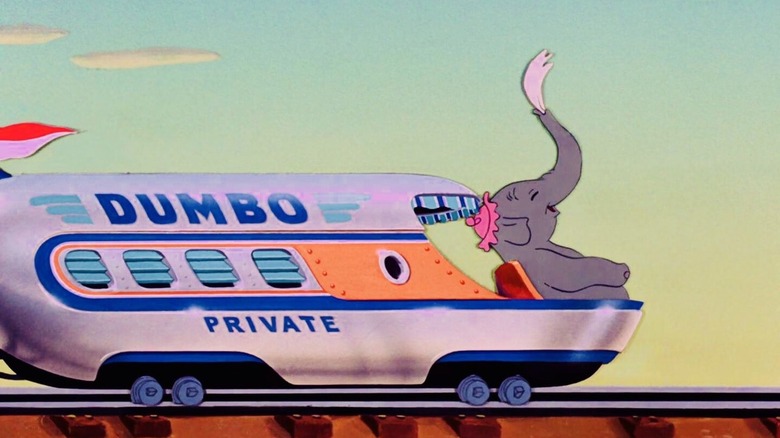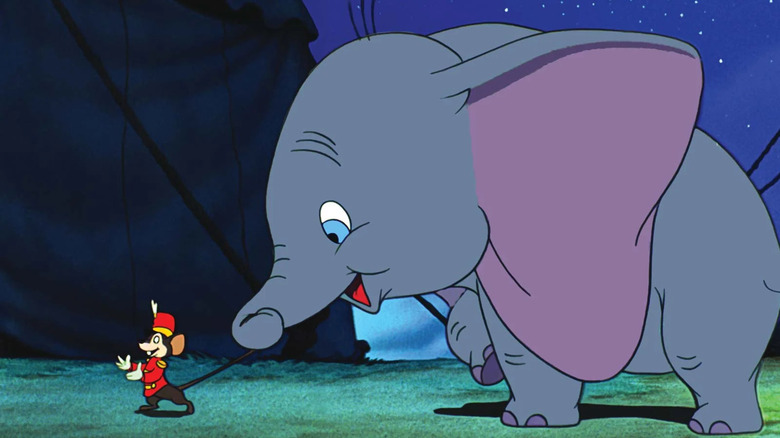Things Only Adults Notice In Dumbo
Disney's 1941 film "Dumbo" remains a classic for good reason. The movie is gorgeously animated, with some sequences that are still as awe-inspiring today as they were 80 years ago. The story is heartwarming, even if it takes a while for things to take an upswing. And it includes some of the best songs from the classic Disney era. It speaks to how good the original is that Tim Burton's live-action remake was considered unnecessary by most fans.
Like most (if not all) movies made for children, there's a good amount of things that only adults will notice in "Dumbo" — perhaps more disturbing details than any other Disney animated movie. From visual sex jokes to a significant amount of uncomfortable race issues and a silent cinema reference that maybe some discerning kid viewers could recognize. Many of the things that only adults notice in "Dumbo" are shockingly dark, especially for a movie that's already pretty sad for most of its runtime, and while some of that darkness makes the movie more emotionally impactful, some of it is simply unnerving, especially when it comes to race.
So without further ado, let's get into the many things only adults notice in "Dumbo."
The storks' bundles look like sperm when they fall
The movie opens with a group of storks delivering a variety of baby animals wrapped up in white little bundles to their animal parents. It's a beautifully animated sequence accompanied by a sweet-sounding but surprisingly ominous song. The song says, "Don't try to get away, he'll find you in the end," "It's useless to resist," and "Maybe he's got his eye on you." These lyrics could be about young men who seek to shirk their fatherly responsibilities. But that's not what we think is the most interesting thing only adults notice about this sequence.
What kids certainly won't notice is that when the storks drop their bundles over the southeastern United States, the bundles look like sperm. Or at least the animated images that we've been led to believe sperm look like. They're bright white bundles that fall to the Earth led by bulbous "heads" and wispy tails of cloth. It's a fun visual gag for adults to pick up on in this very unscientific version of where babies come from.
Many of the animals are single parents
Perhaps it's so that Mrs. Jumbo's (Verna Felton) being a single parent doesn't raise any questions from younger viewers, but it's somewhat surprising and certainly something only adult viewers will notice that almost all of the baby bundles dropped off by the storks in the opening song are delivered to single parents. The kangaroo, bear, giraffe, and hippo babies delivered are all brought to just one adult of that species. In fact, only the tiger cubs are seen to have two parents in this first sequence. (Very classic Disney, to have one absent parent.)
During the "Casey Junior" song when the animals and other circus performers are boarding the train, we do see that some of these seemingly single parents have partners, as there are now two adult kangaroos and two adult giraffes. But the bear and hippo appear to be single parents with new children, and (new to this sequence) we see only one adult and baby camel. So while there is a mix of single- and dual-parent families among the animals of the circus, single-parenthood isn't at all something that's strange or unusual among these animals.
That's a really heartwarming thing to see in a movie from 1941, when a stigma around single parents was disappointingly prevalent. While Mrs. Jumbo's title makes it seem as though she's a widow, we don't get any more information about these other single animal parents, including whether they are male or female. That many of the animal parents are single is one of the few adult details about "Dumbo" that's truly sweet.
Mrs. Jumbo's desire for a kid is all too real for many adults
When those first bundles land and a variety of animals at the zoo gets their new arrivals, we can see Mrs. Jumbo longingly gaze at the sky and grow excited anytime a bundle comes near her cage before veering somewhere else. It's a testament to the animators that her face conveys so much emotion in a sequence that doesn't include any spoken words, a sequence that is impactful to child and adult viewers alike. This sadness and desire for a child are hit upon again during the "Casey Junior" song, when the elephants are loaded onto the train and Mrs. Jumbo scans the sky with one more longing look before boarding. While kid viewers can certainly pick up on the fact that she wants a baby and that she didn't get one makes her sad, the desire to have children while not being able to is all too real for many adults.
Many adults, whether they be single or coupled, are interested in having children and struggle to do so for a variety of medical and social reasons. The story point about Mrs. Jumbo wishing for a child is certainly legible for younger viewers of "Dumbo," but the scene may well carry a significant emotional heft for adult viewers who are interested in having children but cannot for whatever reason.
The elephants' scandalized reactions to the Stork's question
When the stork (Sterling Holloway) delivering Dumbo to Mrs. Jumbo finally arrives after getting a bit lost and falling behind schedule, he asks the elephants, "Which one of you ladies is expecting?" And the reactions from the other elephants read to adults like a group of women scandalized by the concept of having a child out of wedlock; though Mrs. Jumbo's "Mrs." title does make it seem as though there was once a Mr. Jumbo who has perhaps passed away.
Some of the other female elephants simply nervously giggle at the question, but others have surprisingly harsh responses to the stork. One gasps loudly before letting out a huffy "The very idea!" Another, the apparent leader of the pack, also voiced by Verna Felton, is more direct as she shouts at the stork, "Certainly not!" and points at Mrs. Jumbo with a firm "Over there."
These reactions don't really make any sense to kids. Within the framework of the movie, there's no reason these elephants should be offended by the stork asking if they were expecting, but adults can recognize their reactions as rather in line with more conservative morality around childbearing.
The racism
The best-remembered thing about the film for adults, after the fact that it's about a flying elephant, is likely the controversy of "Dumbo" surrounding a group of crows who purposefully evoke minstrel shows and are led by a character named Jim Crow. "Jim Crow" isn't just the name given to the racist laws that very purposefully and explicitly oppressed Black Americans in the U.S. after the Civil War, in fact, that name derives from a blackface act by a white performer made famous in the early 19th century. What makes these scenes even worse is that Jim Crow is voiced by white actor Cliff Edwards, essentially recreating a blackface act through animation.
But those crows aren't the only part of the original "Dumbo" that are uncomfortably racist. The "Song of the Roustabouts" is even more explicit and extreme. The roustabouts of the title are faceless Black men who work to put up the circus tents in the middle of a torrential storm.
The lyrics of the song are truly jaw-dropping (in the worst way) for any adults watching "Dumbo." They sing "We never learned to read or write" and "We slave until we're almost dead," yet they also say "We're happy-hearted roustabouts." It's a song that's explicitly racist, reinforcing narratives that led to slavery in the first place by demeaning Black people and asserting that, as horrid as these conditions are, the workers have attained happiness. More than that, though, the song has some seriously nasty racist stuff in it: "We don't know when we get our pay/ And when we do, we throw our pay away" is a line that characterizes the workers as dim-witted, and at the end of the song, someone shouts, "Grab that rope, you hairy ape." It's a horrifying song in any context, but especially in a children's film.
A lot of race talk from the elephants
Aside from the clear racism that comes up multiple times during "Dumbo," there's also a surprising amount of race talk from the group of elephants who gossip about Dumbo and his mother throughout the movie and also from Timothy Q. Mouse (Edward Brophy). Timothy talks about elephants being a proud race a few times during the movie, and the elephants talk about the dignity of their kind.
It's all a bit strange and uncomfortable, especially given the fact that it parallels too many real-life conversations about race, and the more explicit anti-Black racism in the movie. But it becomes very uncomfortable when the elephants come together to agree that after becoming a clown, Dumbo is no longer an elephant. He's literally excommunicated from his own species because he's forced to be a clown by the circus. It's a wild moment — and while kids can certainly understand the narrative weight of it in the context of the movie, they likely won't notice the real-world parallels to racism and conversations about purity.
Timothy Q. Mouse's shadow looks like Nosferatu's
While a number of things in "Dumbo" that only adults notice are far from fun, this one is just a nice moment that adults in the 1940s would certainly have noticed immediately and cinephile parents watching with their kids today can also pick up on. When Timothy and Dumbo overhear the Ringmaster's (Herman Bing) idea for an elephant pyramid that he needs to come up with a climax for, and especially when he says that maybe an idea will come to him in a dream, Timothy gets an idea.
Timothy decides that he'll whisper in the Ringmaster's ear as he sleeps to make the Ringmaster believe he came up with the idea to have Dumbo perform a brilliant leap to the top of the elephant pyramid. But before he gets to the Ringmaster's ear, Timothy has to enter the tent and approach the sleeping man.
It's in this approach that "Dumbo" calls back to one of the best vampire movies of all time: 1922's "Nosferatu." Timothy's shadow appears on the wall behind the sleeping Ringmaster, and it's a huge shadow, with long crooked fingers and a conspicuously arched back. It's an image that immediately calls to mind the iconic image of Nosferatu's shadow in the 1922 classic as a fun reference for adult viewers in a movie otherwise aimed at kids.
The clowns don't care if they hurt or even kill Dumbo
The first performance with Dumbo as a clown shows him getting stuck in a burning building and needing to be rescued by bumbling clowns who keep making things worse instead of better before he finally leaps into a tub of foam. It's a huge success with the audience, and the clowns are over the moon about how well their show went, but they think it could be even better if they went bigger.
One of them says, "This gives me an idea: Let's raise the platform the elephant jumps off of," and he gets quick agreement from one of his peers — "Yeah if they laugh when jumps 20 feet, they'll laugh twice as hard if he jumps 40 feet!" This then sets all the clowns off discussing how they could and should raise the platform as high as it can go.
When one of the clowns says, "Hey be careful, don't hurt the little guy," he gets told that elephants are practically made of rubber and have no feelings before the rest of the clowns decide that this is a "sensational idea" and that they're going to go have a talk with the boss. It's a brutal moment, the severity of which likely only really registers with adult viewers.
Dumbo and Timothy get drunk and hallucinate the pink elephants
After the uncomfortable racism of the crows, perhaps the thing most adults remember best about "Dumbo" is the fact that our young elephant hero and his trusted Mouse sidekick (or manager?) drink some champagne left out by the celebrating clowns and end up hallucinating an entire psychedelic musical number. The hallucinatory intensity of "Pink Elephants on Parade" seems like something that would have to come from something more like absinthe than champagne, but we're talking about a movie where an elephant and mouse get drunk, so realism isn't a key goal.
The cause aside, "Pink Elephants on Parade" is an incredible animated sequence that's the stuff of animation legend. The transitions between the figures, the bright but somewhat translucent colors, and the undeniably frightening design of many of the pink elephants are all astounding to behold even 80 years later. It's a sequence that exists just to show off some incredible animation.
Really, though, there's no need for the sequence narratively — sure Dumbo and Timothy have to get up a tree and not know how, but there's no need for their drunkenness to result in a minutes-long hallucination sequence. That said, we're very glad it exists and is part of the movie because it's one of the most beautiful, and spooky, animation sequences ever made.
Deviation from the norm will be punished unless it is exploitable
Adults who have been on the internet for a while are likely familiar with the seasonally shared meme showing an image of the stop-motion Rudolph the Red-Nosed Reindeer with the text "deviation from the norm will be punished unless it is exploitable." The meme has been making its way around social media around the holidays for years and offers a sad but undeniably accurate read of the story of Rudolph, who is teased until his bright red nose becomes useful to Santa on a stormy night. The text certainly has larger political and social implications, and some have added the clarifying statement "under capitalism" to the start of the text, but even without considering those implications, it's a fair read of a beloved children's story.
But the meme could just as easily have used an image of Dumbo. Dumbo is literally turned into a clown and is about to be launched potentially to his death in a circus act because his ears are deemed too large, strange, and unbecoming of an elephant. But when it's discovered, by the Ringmaster, that Dumbo can fly, he becomes the star of the show, which in turn makes the Ringmaster money. Dumbo is rewarded with a private train car, and Mrs. Jumbo is freed from her prison to spend time with her loving son, who just so happens to be the major draw for the circus precisely because of the deviation from the norm that initially made him an outcast.
Dumbo never talks
Some kids may have an eye, and ear, for filmmaking choices, but we think the fact that the titular Dumbo never says a word throughout the entire (albeit short) runtime of the movie largely only goes noticed by adult viewers. Like Pinocchio before him and Bambi (and many others) after him, Dumbo has a talkative and much smaller friend/guide/mentor who does much of the talking for him. But unlike those other classic Disney characters, Timothy Q. Mouse is the only one of the central pair who does any talking in "Dumbo."
The fact that Dumbo's silence in his own movie doesn't stick out as distracting or even really noticeable to younger viewers speaks to how well the movie is made. Both in terms of how much emotion the animators are able to show in Dumbo's many facial expressions throughout the movie, and Timothy's fast-talking that keeps us so interested and engaged that it feels like a two-sided conversation when he talks to Dumbo. (Unsurprisingly, Timothy is not present in Tim Burton's remake.)
In a strange way, Dumbo's silent protagonist mode also makes him more sympathetic — the only way he conveys his emotions is through his facial expressions. In the same way that some action heroes are blank slates, Dumbo's lack of dialogue allows viewers to see themselves in him and thereby experience all the emotional moments of the movie more directly.
